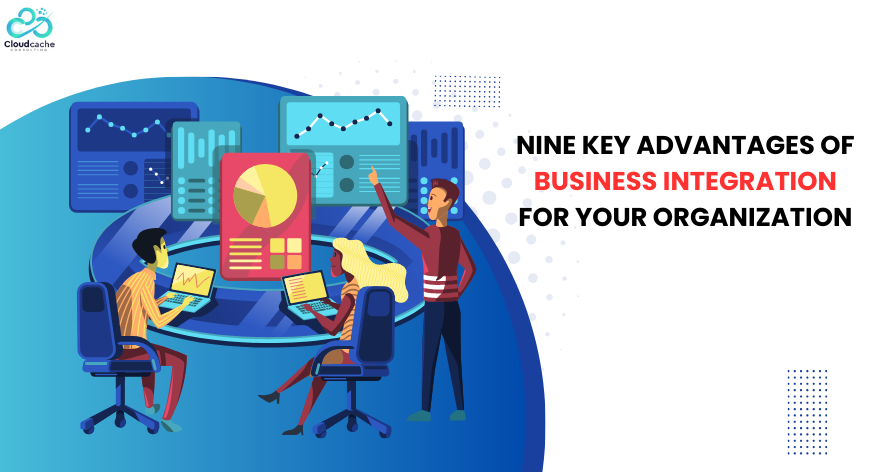November 16, 2023, admin
In the modern business world, various organization’s departments often rely on distinct suites of SaaS applications and on-premise systems to fulfill their respective functions. Your marketing team may also depend on a platform like Marketo for lead management. At the same time, Sales representatives utilize Salesforce for prospect interactions, and customer support teams rely on ServiceNow for issue resolution, among other scenarios.
Despite these distinct roles, the data accumulated and employed by each department’s tools often holds significant value for other facets of your organization. This raises the fundamental question: How can you ensure teams gain access to data that could enhance their operations? The answer lies in establishing integrations that seamlessly connect your applications and systems, enabling the free data flow among them.
To further underline the merits of business integration, we present nine pivotal ways it can significantly benefit your organization:
- Efficient Data Handling: Business integration eliminates manual data re-entry, a time-consuming task that can become cumbersome when dealing with numerous client accounts. Through system integration, you can connect data-collection applications and construct workflows that instantaneously share client information across various platforms, thus alleviating the need for manual edits.
- Optimized Data Utilization: Data often possesses multifaceted utility across different organizational functions. For example, product usage data can be integrated into a data warehouse platform, Disseminating this information to various systems. This enhances accessibility and facilitates functions such as identifying upsell/cross-sell opportunities for customer success managers, providing targeted support for customer support representatives, and optimizing marketing strategies for marketers.
- Seamless Work Environment: With integrated data residing in a single location, there is no longer a need to switch between multiple applications in search of information. This streamlines operations, saves time, and ensures smoother business processes.
- Enhanced Collaboration: Integrated systems foster collaboration by enabling colleagues to access a unified dataset. For instance, a customer success manager can view an invoice status in the CRM platform, while a finance colleague observes the same information in an ERP system like NetSuite. This unification extends to HR, where managers can access employee data in HRIS, and IT personnel can find the same information in their ITSM platform. Similarly, marketers and sales representatives can access lead scores across their platforms. This consistency in data access promotes clarity, reduces miscommunication, and encourages more productive collaboration across business processes.
- Preserving Legacy Systems: Transitioning away from legacy systems can present challenges, including cost, time investment for training, and the potential unique value of these systems to your organization. Integrating your legacy systems with modern, cloud-native counterparts can allow you to retain the benefits of the former while leveraging their data more effectively through the latter.
- Enhancing Decision-Making: The quality and quantity of data available significantly impact your analysts’ ability to make informed decisions. Data integration provides analysts with vast quantities of accurate data by collecting, transforming, and loading it into a synchronized data warehouse connected to their business intelligence and analytics tools.
- Scalability: Organizations are consistently adopting a growing number of applications. An efficient system for integrating various systems allows for easy accommodation of new applications over time, ensuring their full utilization.
- Enhanced Client Experiences: Meeting and exceeding client expectations is crucial in today’s competitive landscape. An integrated system empowers your team to enhance client experiences by:
- Providing customer-facing employees with comprehensive client data in a single application, enabling faster and more thoughtful actions.
- Streamlining issue escalation and resolution among support representatives.
- Facilitating real-time notifications for collaborative issue resolution.
- Efficient and Secure Integration Building: Building integrations at scale has never been more accessible. Non-technical employees can utilize low-code/no-code platforms to swiftly, reliably, and securely connect on-premise and cloud-based systems. Workato, a leader in enterprise automation, offers connectivity to thousands of SaaS applications, databases, legacy systems, and more without requiring coding. Additionally, it enables the creation of end-to-end workflow automation based on triggers and actions, transforming core processes across your organization.
Conclusion
In the modern digital world where harnessing the full potential of Salesforce is paramount, CloudCache Consulting emerged as the premier partner to empower your organization with Salesforce and Workato capabilities. Our dedicated team of Salesforce Consultants and rich professional resources stands ready to transform your business operations, streamline workflows, and unlock unparalleled growth opportunities.
Trust us to be your guiding hand in navigating the ever-evolving Salesforce ecosystem. Elevate your business with CloudCache Consulting, your trusted partner for Salesforce success. Join the ranks of satisfied clients who have found us on Upwork and witness the difference.
